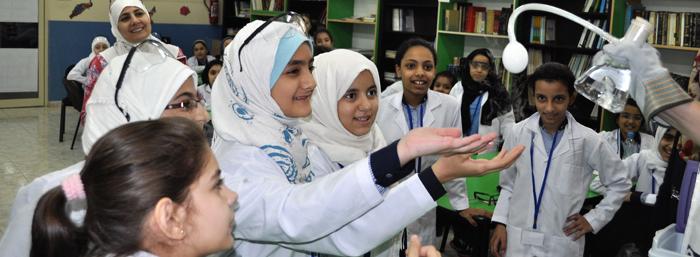- About
- Admissions
- Study at AUS
- Prospective Students
- Bachelor's Degrees
- Master's Degrees
- Doctoral Degrees
- Admission Publications
- International Students
- Contact Admissions
- Grants and Scholarships
- Sponsorship Liaison Services
- Testing Center
- New Undergraduate Student Guide
- New Graduate Student Guide
- File Completion
- New Student Orientation
- Payment Guide
- Executive Education
- Students with Disabilities
- Academics
- Life at AUS
- Research
- Contact Us
- Apply Now
- .

AUS Lab on Wheels highlights inventions of Arab and Muslim world
To highlight the inventions of the Arab and Muslim world, American University of Sharjah (AUS) student volunteers implemented a project entitled Lab on Wheels to conduct simple yet informative experiments at local secondary schools. Lab on Wheels is an interactive approach that combines teamwork and learning-by-doing, and boosts students' cultural confidence through simple yet informative mobile laboratory experiments that the students can perform at their school premises.
During this academic year, over 80 AUS volunteers will visit schools with the materials required to perform experiments, and help students in building them. Lab on Wheels improves hands-on skills for students, improves teamwork and problem solving skills and promotes voluntary work among our community.
The experiments performed included the "pin hole camera" experiment developed by Al Hassan bin Al Haitham, well known for his significant contribution to the science of optics, and the "Dry Ice" experiment by Jaber bin Hayyan, who developed alchemy into an experimental science.
The idea of Lab on Wheels was initiated by Dr. Mohammad Nazzal, Visiting Associate Professor in the AUS Department of Mechanical Engineering. Through this initiative, AUS students attempt to remind the school students of the contribution of Arab and Muslim scientists to the modern sciences through the experiments, enabling them to believe that they too have the ability to contribute to the advancement of science and technology.
In each visit, the AUS volunteers spend around three hours at each of the visited schools, and provide tools for the experiments including goggles, lab coats, badges, cardboard, tape, beakers and other simple tools.
Over 180 sixth grade students have benefited so far from this initiative.
"We learned how to build a pinhole camera model and it was much easier than we expected. We worked in teams and we played with dry ice. We did not know that a lot of the current inventions are based on the contribution of Arab and Muslim scientists," said a student of Al-Tala'a public school. "We enjoyed every moment the volunteers spent at our school and we hope they visit us again."
According to Bayan Naser Hamdan, a junior majoring in industrial engineering, "Through interacting with students and practically relating some common technologies of today to the accomplishments of our Arab ancestors, Lab on Wheels was a unique and rewarding initiative that was fun and enriching to both the students and us volunteers. I hope to visit more schools in the future."
"We presented the experiments in an interactive style that attracted the students' attention. The efforts spent by the AUS volunteers show that AUS believes in social responsibility and in its role in shaping future generations," said Awadallah Al Nerab, a mechanical engineering senior.
"The project serves the university's vision stating that Science and education must regain their rightful place in the advancement of our society and in shaping the lives of our children. It also implements another AUS value stating that purpose of higher education is to reshape the minds of our youth in order for them to address personal and social challenges using the scientific method." said Dr. Nazzal.
With a long waiting list of schools and volunteers interested in the project, Lab on Wheels will continue and expand by developing new experiments for different grades.

